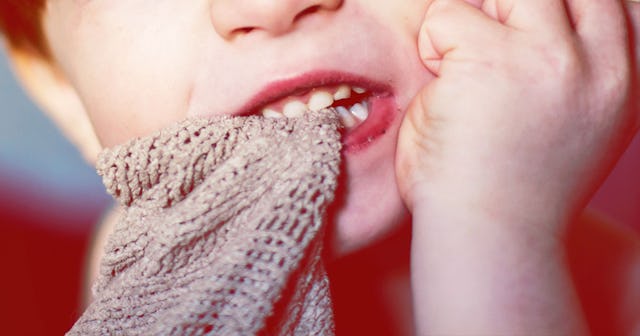So Your Kid Is A Biter – Now What?

We were sitting on the couch when a girlfriend got the dreaded call from school. No, not lice, the other call. Her son had bitten another child. She knew it was coming; he had been doing it at home for quite some time to his sister. He had recently stepped out of the sibling comfort zone and bitten a cousin, leaving a pretty sizable bruise. He was chomping down hard. She prayed that wasn’t the case with this student.
Due to privacy, the teacher couldn’t tell her who he bit, only that the child was OK and that he hadn’t broken the skin. They had addressed the situation, but explained that it was serious and dangerous and that it could not happen again. Trying to tell a three-year-old that they’re risking expulsion from preschool if they don’t quit physically attacking their friends is no easy task. But, you’ve gotta do what you’ve gotta do.
She packed it up and headed to pick him up from school. She was distraught, and my heart broke for her. My own child hadn’t been a biter, but he was a hitter — and man, I felt the pain that goes along with being the parent of a child that is hurting another child. There is so much shame that comes along with a child who misbehaves and it is often really unfair. Parents need to give each other grace. If your child has never bitten, congratulations, but that certainly doesn’t make you any better than the parent of a child who does. Check yourself before you judge.
Biting is certainly not desirable, but it is actually pretty normal behavior in children three years and younger. They are doing these behaviors to get attention, but not really to hurt someone the way that they are. No child wants to injure their friends. They can’t understand the kind of pain they are inflicting. A lot of times a child bites because they can’t communicate their feelings. Biting makes an impact. You can get someone’s attention really quickly when you sink your teeth into them.
I wanted to help, so I consulted a friend of mine who is in early childhood education. I thought she would be a good resource. And I went to the holy grail of experience and opinion, the mommy groups. I know they can get a bad rap for anti-vax zealots and all-knowing doctors who got their degree watching “Grey’s Anatomy,” but they are also loving moms and I wanted their help. Here is what I gathered.
Create a Plan
If biting is happening at home, it’s likely happening at daycare or school as well. Open a dialogue with your child’s teachers. Let them know that you are concerned and want the behaviors to end. Work together creating similar redirects and consequences so that there is continuity at home and away.
Act Quickly
As soon as the bite takes place, make the biter face the bitee. Have them look at the bite so that they can see what they have done. Show them that their friend is hurting. Tell them no. Try to make the child empathetic. Let them know that it is not OK and that they have hurt someone. Make them apologize immediately then take them out of the situation. Time out and a moment to reflect on what they have done can be helpful.
Make the Biter Feel the Pain
AndrewLam/Getty
I don’t mean physical pain — as tempting as it may be, never, ever bite your child back! This will only encourage the behavior, making them think that biting is OK. No soap, hot sauce, or vinegar either. This is a child who can be spoken to and hopefully reasoned with without having to take such drastic measures. Instead, comfort the child who has been bitten and walk away. It can be just as impactful to be left alone to think about your actions while someone else is getting a hug.
Watch for Triggers
Keep a close eye on your biter and what may cause them to bite. We can’t all be helicopter moms circling our children at all times — it’s unreasonable and no fun — but we can watch out for a few things. If you can identify a trigger, be ready to step in and redirect. Sometimes all a child needs is a quick distraction to forget what they are upset about.
Open Your Ears
Be ready to listen. Tell them to use their words, not their teeth. Sometimes a small child can’t say to another small child, “you hurt my feelings by taking that toy from me,” so they bite. Explain to your child that if they are frustrated, or angry, or just feeling overwhelmed, it is always OK to talk to an adult. You will be there to listen no matter what. Remind them that it is OK to yell or to cry or to walk away, but it is never OK to hurt someone else.
At the end of the day, you need to let your biter know that you love them. And know that your biter loves you and they really aren’t out for blood. If you are consistent, loving and firm, it will get better. Just remember, no one goes to high school biting their friends. Before you know it, this will pass.